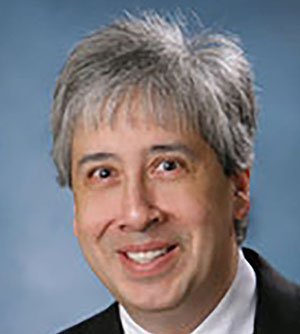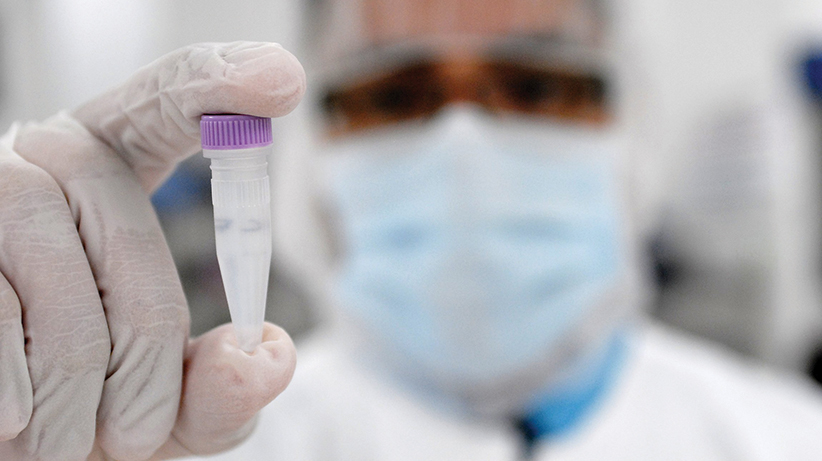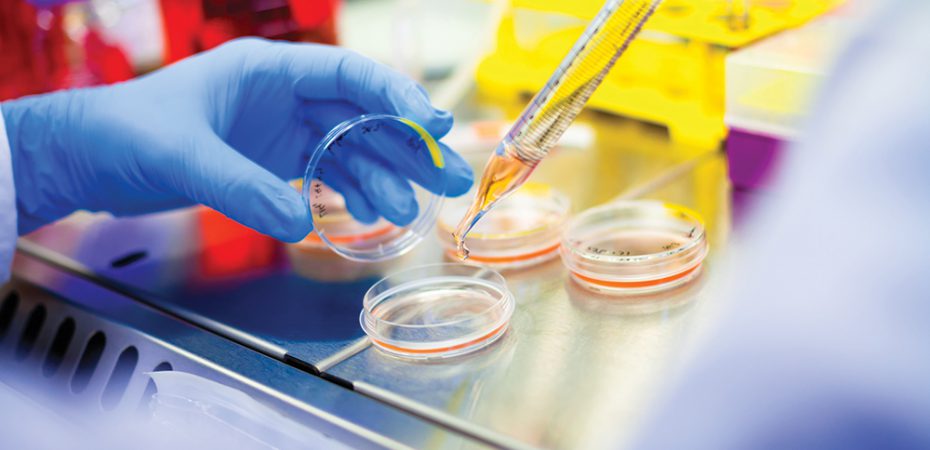Ethically Advancing Scientific Research and Medicine
Developing better ways to provide cheaper, reproducible and safer adult stem cells to replace the need for embryonic stem cells
Carlos Briceño Comments Off on Ethically Advancing Scientific Research and Medicine
The John Paul II Medical Research Institute, a nonprofit medical research organization whose mission is to advance research and education in regenerative and personalized medicine in a manner consistent with pro-life bioethics, strictly focuses on adult stem cell and induced pluripotent stem cell research and education. The institute also coordinates research activities between the institute, academia and industry and finds treatment solutions for patients with disorders that could potentially benefit from adult stem cells.
Dr. Alan Moy founded the institute, which is based in Coralville, Iowa, in 2007. Carlos Briceño interviews Moy to find out how his Catholic faith helps him to build a culture of life with the mind-set of Christ the Servant.
The Deacon: What led you to become a doctor?

Dr. Alan Moy: It was no big secret. I was always interested in becoming a doctor at a very young age. I was interested in being a doctor since I was 8 years old. I was always interested in math and science. There weren’t many competing career interests for me other than being a doctor.
TD: What prompted that? Was it because you wanted to help people?
Moy: I liked the idea of a doctor as a profession. There wasn’t anything that struck me at the time. My mother was a nurse, and my father was an engineer. I liked math and science. Medicine was sort of an interest within our family.
TD: What ways are you being a witness to the Catholic Faith in your works as a doctor?
Moy: The underpinning principles of my faith centers on the Hippocratic oath as a doctor and scientist. Trying to figure out how to cure diseases as a physician and scientist [and] at the same time to achieve that goal within the framework of being a Catholic is important — that is, developing a cure without having to destroy human life through conducting scientific experiments on human embryos to avoid fetal tissues or cell lines derived from remote abortions are very important to me.
Currently, in the field of biotechnology, to be able to achieve that because you want and need human cells and tissues to conduct medical research, there has been a lack of ethical human cell lines that have been available for decades. And over the span of these decades, there has been a ubiquitous use of aborted fetal cell lines in medical research and within the biopharma industry. So it’s a huge problem for Catholic doctors and scientists who want to pursue careers in medical science, and there has been a lack of solutions over that span of time.
There has been no concerted effort by Catholic institutions to address this problem over the past half-century, so I felt compelled that this was something that was important to me.
TD: What led you to intersect your faith with your medical work?
…………………………………………………………………………………………………………………………………………………………..
A Mission to Serve
The National Catholic Bioethics Center in Philadelphia provides education, guidance and resources for the Church and society to uphold the dignity of the human person in healthcare and biomedical research, thereby sharing in the ministry of Jesus Christ and his Church. Get more information at ncbcenter.org
…………………………………………………………………………………………………………………………………………………………….
Moy: I’ve always wanted to solve and put an end to the need to use abortifacient tissues and embryonic tissue in medical research. To show you don’t have to violate your Hippocratic oath and [still] conduct good science to advance medicine.
So, for example, we develop better ways to provide cheaper, reproducible, safer and ethical adult stem cells to replace the need for embryonic stem cells. I took a lot of heat from secular scientists when I started our biotechnology company and the John Paul II Medical Research Institute. We could not get grants. I took a lot of criticism from politicians. We couldn’t get money from traditional venture capitalists. And Iowa, which is where I’m located, is not known for its expertise in stem cell research.
I did not have a track record in stem cell research when I was on staff at the University of Iowa, and obviously I didn’t have any expertise in stem cell manufacturing. So, you could not ask for a better scenario for failure. We had to figure out how to bootstrap our organization. I took significant risks, and my professional colleagues thought I was crazy.
I started from nothing. I started a biotechnology company in 2005, manufacturing adult stem cells because they were not generally commercially available to scientists. And I gave up my tenured academic position, and the only solution for me to achieve that was to start a solo specialty practice at a small Catholic hospital across town. I used and leveraged that opportunity to produce the largest portfolio of adult stem cells in the world.
…………………………………………………………………………………………………………………………………………………………….
What Does the Church Say about Stem Cell Research?
The U.S. Catholic bishops (usccb.org) presents the following information about Catholic support for ethically acceptable stem cell research:
“Sometimes it is wrongly said that the Catholic Church opposes stem cell research. In fact, the Church supports ethically responsible stem cell research, while opposing any research that exploits or destroys human embryos.
“Because the Church opposes deliberately destroying innocent human life at any stage, for research or any other purpose, it opposes embryonic stem cell research as currently conducted. However, when scientists proposed avenues for possibly obtaining embryonic stem cells or their pluripotent equivalent without creating or harming embryos, Catholic leaders were among the first to welcome this idea. …
“The Catholic Church has long supported research using stem cells from adult tissue and umbilical cord blood, which poses no moral problem. Catholic institutions at times have taken the lead in promoting such constructive research, which is already providing cures and treatments for suffering patients.”
………………………………………………………………………………………………………………………………………………………………
And those cell lines are now sold and used by scientists around the world, and now there are over 100 peer-reviewed publications from scientists that use the cell lines. We are the sole-sourced manufacturer of some very rare stem cells for the U.S. Navy. So, we persisted, and we eventually built a scientific reputation that has been recognized by the standards of the secular biotechnology industry without having to compromise my Catholic morals.
There have been many times when things appeared hopeless, but I believe God intervened. I have developed confidence that Christ is present in the work we do. I don’t know what the future holds, but I know the mission of the institute is very important, and I think it’s important to Christ.
The Catholic Church doesn’t always give good instruction to professionals as to what we are supposed to do to advance the Catholic culture in our respective professions. The Church tells us that we should not do certain things, through the Ten Commandments. To change the world by changing the culture, there’s very little instruction from the Church because that requires risk, sacrifice and courage, and no one wants to tell people they have to take risks, make sacrifices and show courage when their profession is on the line. Christ is very clear in his teachings that that is exactly what he expects from us.

TD: How was your faith formed, that led you to have this kind of courage?
Moy: I don’t know if there is anything unique to my Catholic upbringing. I’m probably about as average in my Catholic upbringing as anyone else. I was raised in a Catholic family. My parents were Catholic. I went to Catholic schools. I went to Catholic medical school. I was trained in a Catholic medical residency. I have been exposed to Catholic teachings, both from a very young age to my professional career. I have been exposed to the things that, as a professional medical physician and scientist, are important for a Catholic.
That helps when you have that background, to begin with. What I see is different from what my colleagues believe is that, when I was young, my father died at a young age. When I saw that, I just said there are certain things you have to accomplish in your lifetime. So that sense of mortality created an imprint on my life. So when I look at what I want to project back into my life when that ends, I don’t want to have a conversation with God, and God says to me, “Why didn’t you do something about this problem?”
So I can feel confident and comfortable that if I try my best and fail, then I have no excuses, and that’s what drives me.
TD: How is Christ the Servant present in your ministry?
Moy: I would say that we are not afraid of stating that we are a pro-life biotechnology company. We are also a pro-life nonprofit. And we’re in an industry as secular as one comes that supports the culture of death.
We are one of the few voices that are unabashed and unafraid of identifying who we are. We make no apologies. We have every intention to build a pro-life biotechnology industry sector, and I think that helps other Catholics and pro-life Catholics who see that and can generate some of their own courage, and they’re very interested in wanting to join us.
We constantly receive calls from Catholic students, scientists, doctors who want to join us because of our underlying mission. These people often convey the problems that they have and the fears that they have when they work in the biotechnology industry. They are struggling with how to reconcile their Catholic faith with their profession. This is a very difficult area for these people.
We help them and, hopefully, our example gives them some inspiration and the ability to find the courage in their own profession and in their own faith. We are not afraid to take the heat when it comes our way.
We try to speak truth. We try to show through our work and our example how we are trying to pursue a pro-life healthcare vision. That is the foundation of our institute.
TD: Because deacons are called to witness to Christ the Servant, how have you been inspired by Christ the Servant in your medical work?
Moy: God gives you the grace to see this through and [the] courage and ability to persevere.
TD: In your relationship with Christ, because you are so countercultural, how has your relationship with Christ helped you?
Moy: I’m not sure how my example is going to be any different than what I said. He gives us the ability to endure and to persist and try to continue the best we can in our missions. I don’t have any great insight as to how he does it. He just gives us the graces to be able to see the work through.
CARLOS BRICEÑO is the editor of Christ is our Hope, the magazine for the Diocese of Joliet, Illinois. He is a longtime journalist whose work has appeared in Our Sunday Visitor, the National Catholic Register and Vatican Radio.
…………………………………………………………………………………………………………………………………………………………
Core Research Areas of John Paul II Medical Research Institute
The John Paul Il Medical Research Institute is a secular organization that is grounded in pro-life bioethics that respects the dignity of every human life. The name, honoring Pope St. John Paul II, clearly demonstrates an unwavering commitment to the culture of life. The institute advocates for medical research that recognizes the dignity of human life from the moment of conception to natural death.
The core areas of research include: cancer — breast cancer, lung cancer, colorectal cancer, leukemia, liver cancer, brain cancer and others; neurological diseases — Alzheimer’s disease, Parkinson’s disease, ALS, multiple sclerosis, muscular dystrophy and others; rare diseases — Alpha 1, Hunter’s Syndrome, Niemann-Pick and others; chronic diseases — diabetes, spinal cord injury, eye diseases, COPD, lung diseases, cystic fibrosis and others. Get more information at jp2mri.org.
…………………………………………………………………………………………………………………………………………………………..





